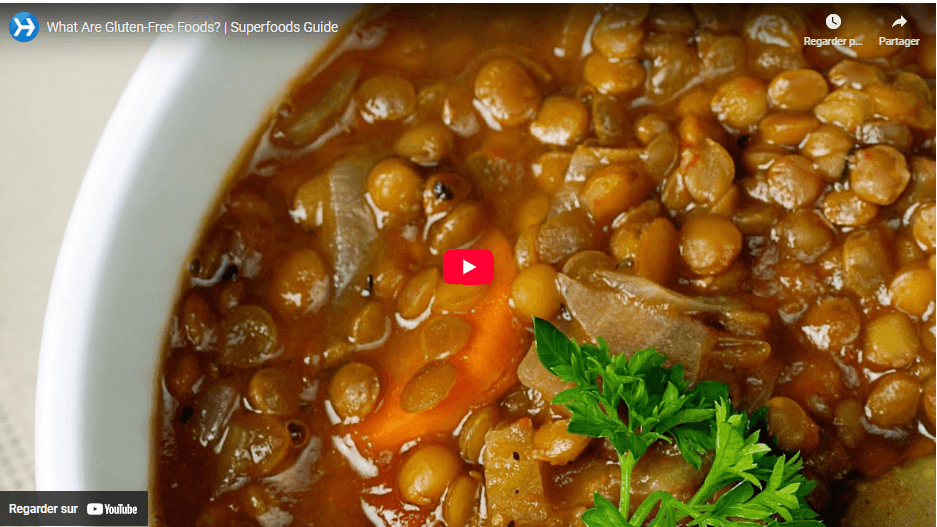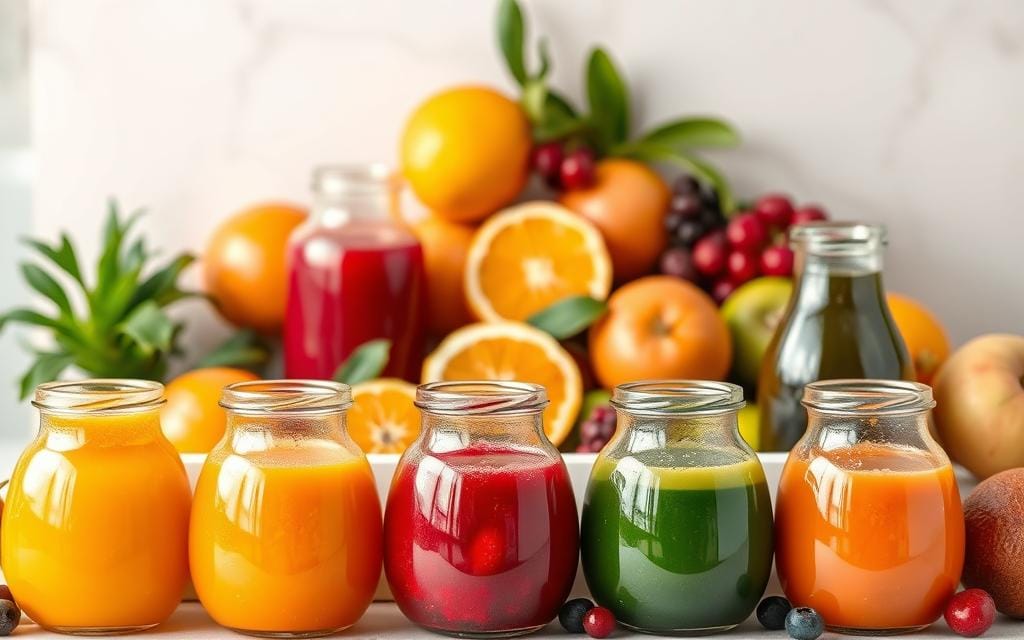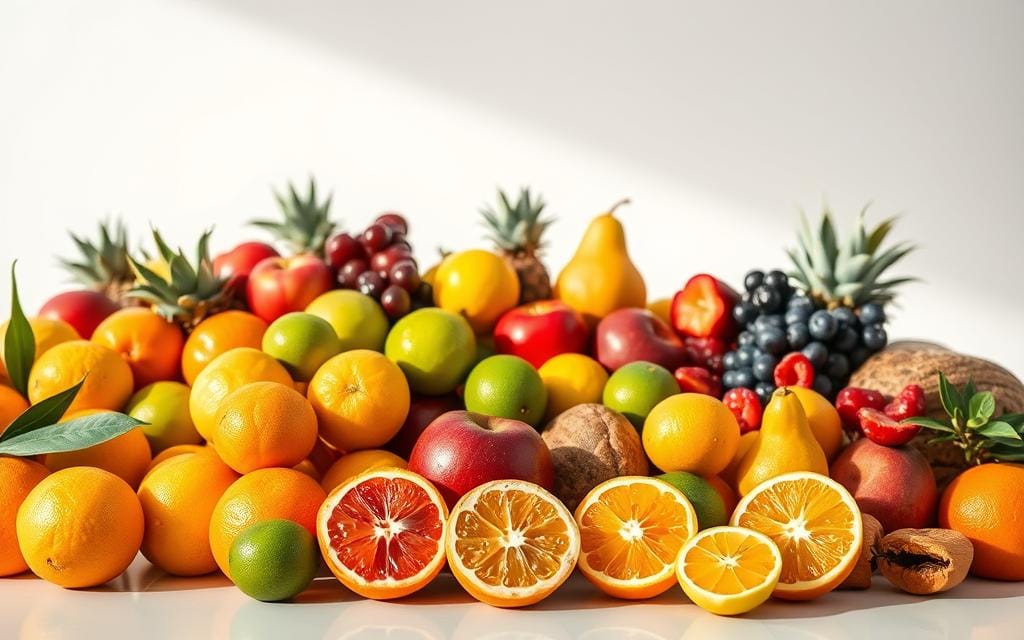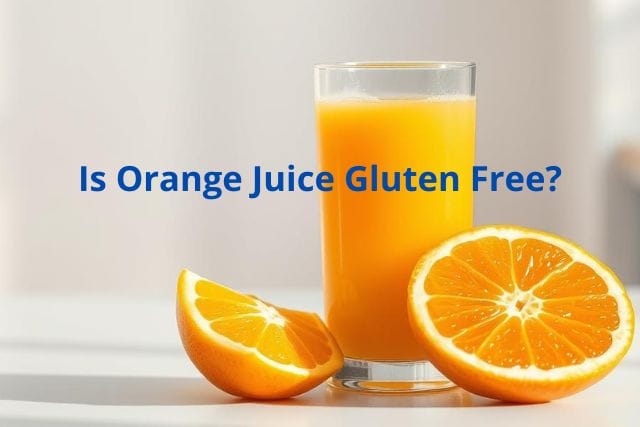A vibrant and appetizing still life showcasing a glass of freshly squeezed orange juice, set against a clean and modern background. The juice is a rich, golden hue, with a slight frothy texture, reflecting the natural sweetness and vibrance of the fruit. The glass is sleek and minimalist, allowing the juice to be the star of the composition. Soft, natural lighting illuminates the scene, creating a warm and inviting atmosphere. The overall composition conveys a sense of purity, health, and gluten-free goodness, perfectly aligning with the guide’s subject matter.
Ever thought about the gluten in your orange juice? For those with celiac disease or gluten sensitivity, knowing if orange juice is gluten free is key. It’s not just a simple question—it’s a health matter.
Fruit juices seem like they should be gluten free. But, the truth is more complex. There’s cross-contamination and hidden additives to consider. So, is orange juice gluten free? It’s not always clear.
This guide dives into the world of juice making. We’ll help you understand gluten in juices. Whether you’re looking at Jamba Juice or just want to know if juice is safe, we’ve got you covered.
Table of Contents
Key Takeaways
- Orange juice is typically gluten free in its natural state
- Cross-contamination can pose risks during juice production
- Always check labels for possible gluten-containing additives
- Some commercial juice brands may have hidden gluten sources
- Certification symbols can help identify truly gluten-free juices
Understanding Gluten and Its Presence in Beverages
Exploring gluten in drinks can be tricky. Gluten is more than you might think, with hidden sources that might shock you.
What Exactly is Gluten?
Gluten is a protein found in wheat, barley, and rye. It keeps foods together, giving them shape and texture. Knowing if barley grass juice has gluten is key.
- Composed of two main proteins: gliadin and glutenin
- Provides elasticity in baked goods
- Can trigger immune responses in sensitive individuals
Common Sources of Gluten in Drinks
Drinks can have gluten from unexpected places. Barley grass juice, for example, needs a close look to see if it has gluten.
| Beverage Type | Potential Gluten Source | Risk Level |
|---|---|---|
| Beer | Barley | High |
| Malted Drinks | Barley Malt | High |
| Flavored Beverages | Added Grain Extracts | Medium |
Cross-Contamination Risks
Even gluten-free products can get contaminated. Factories that make many things can spread gluten to drinks.
- Shared equipment can spread gluten particles
- Processing environments increase contamination risk
- Always check labels for possible warnings
Knowing these details helps you choose drinks wisely, if you’re gluten sensitive.
Is Orange Juice Gluten Free: The Definitive Answer

Wondering if orange juice is gluten free? The good news is that pure, natural orange juice is usually gluten-free. Oranges themselves don’t have gluten, making the juice safe for those with gluten sensitivities or celiac disease.
Pure orange juice comes from oranges, which are naturally gluten-free. So, when you drink 100% pure orange juice without any added stuff, you can trust it’s gluten-free.
- Fresh-squeezed orange juice is naturally gluten free
- Pure orange juice contains no wheat, barley, or rye proteins
- Oranges do not inherently contain gluten
Just make sure to check the label for any additives or processing methods that might add gluten. Some commercial orange juices might have extra ingredients that aren’t gluten-free.
| Orange Juice Type | Gluten-Free Status | Considerations |
|---|---|---|
| Fresh-Squeezed | 100% Gluten Free | No added ingredients |
| Commercial Pure Juice | Typically Gluten Free | Check label for additives |
| Fortified Juice | Potential Gluten Risk | Verify ingredient list |
If you’re gluten sensitive, always check the brand and read labels carefully. While orange juice is usually gluten-free, there’s a small chance of gluten contamination during production.
Natural vs. Commercial Orange Juice: Gluten Considerations
Understanding the difference between natural and commercial orange juice is key. Your choice affects your diet, which is important for those with gluten sensitivities.
Fresh-squeezed orange juice is safest for those worried about gluten. It comes from whole fruits and has no gluten. But, added ingredients or processing can introduce gluten risks.
Fresh-Squeezed Orange Juice Safety
Making orange juice at home is the best way to avoid gluten. It keeps your juice free from cross-contamination found in commercial products.
- 100% pure fruit with no additives
- Direct control over ingredient sourcing
- Minimal processing reduces contamination risks
Store-Bought Orange Juice Brands
For store-bought options like Jamba Juice gluten-free, reading labels is key. Not all commercial juices are gluten-free.
Added Ingredients to Watch For
Gluten can hide in orange juice with added ingredients. Look out for:
- Vitamin fortifications
- Flavor enhancers
- Preservative blends
“Always read labels carefully to ensure your orange juice meets your dietary requirements.” – Nutrition Expert
Look for certified gluten-free labels to be sure of your orange juice choice.
Popular Fruit Juices and Their Gluten Status

A vibrant still life showcasing an assortment of freshly-pressed gluten-free fruit juices. In the foreground, a row of glass jugs filled with vibrant orange, crimson, and emerald-hued juices, their surfaces glistening under soft, diffused lighting. In the middle ground, ripe fruits such as oranges, apples, and berries are arranged artfully, their natural textures and colors complementing the juices. The background features a minimalist, light-colored backdrop, allowing the juices and fruits to take center stage. The overall composition conveys a sense of health, wellness, and the natural goodness of gluten-free fruit juices.
Many people ask if apple juice and cranberry juice are gluten free. These questions are important for those with gluten sensitivities or celiac disease.
Pure fruit juices are usually gluten free. Apple and cranberry juices, made from just fruit and water, don’t have gluten.
- Apple juice: Naturally gluten free when made from pure apples
- Cranberry juice: Generally safe for gluten-sensitive individuals
- Grape juice: Typically gluten free
- Pomegranate juice: Usually gluten free
Even though they’re naturally gluten-free, always check the labels. Some juices might have gluten from:
- Added flavors
- Cross-contamination during processing
- Potential grain-based additives
| Juice Type | Gluten Status | Recommended Caution Level |
|---|---|---|
| Pure Apple Juice | Gluten Free | Low |
| Pure Cranberry Juice | Gluten Free | Low |
| Flavored Juice Blends | Potential Gluten Risk | High |
To be sure, look for certified gluten-free labels. These labels mean the juice has been tested and is gluten-free.
How to Identify Gluten-Free Juices at the Store
Finding gluten-free juices in the store can be hard. It’s important to know how to pick safe options. This helps keep you healthy by avoiding gluten.
Decoding Product Labels
When checking if apple juice is gluten-free, start with the labels. Look closely at these parts:
- Check the ingredient list carefully
- Look for explicit “gluten-free” statements
- Scan for possible cross-contamination warnings
- Verify the processing facility information
Certification Symbols to Trust
Trustworthy certifications make shopping easier. Here are the symbols to look for:
- GFCO (Gluten-Free Certification Organization) logo
- FDA-approved gluten-free certification
- Certified Celiac Support Association mark
Spotting Hidden Gluten Sources
Some juices have hidden gluten. Be careful of:
- Malt derivatives
- Modified food starch
- Artificial flavors from wheat-based sources
- Vitamin additives with gluten-containing carriers
Stick to simple, pure fruit juices. Always check the labels carefully.
Cross-Contamination Risks in Juice Production
Exploring gluten-free drinks means understanding cross-contamination risks. Juice making is complex and can introduce gluten into safe drinks. Knowing these risks is key to your health.
Manufacturers dealing with many products face big contamination risks. Barley grass juice might seem safe, but shared facilities can be a problem. Wheat, rye, and barley can easily mix with other products.
- Production equipment shared across different product lines
- Airborne particle transfer during manufacturing
- Insufficient cleaning protocols between batches
- Ingredient storage proximity
Good juice brands have strict rules to avoid these risks. Is barley grass juice gluten free? It depends on careful testing and special production areas. Look for gluten-free labels to be sure.
Celiac patients and those sensitive to gluten must be careful. Check how products are made, ask for details, and choose brands that are open about their methods. This helps keep your diet safe.
Always verify production practices before consuming any juice product.
Health Benefits of Gluten-Free Juices
Gluten-free juices are more than just safe drinks for those with dietary needs. They are full of nutrients that can boost your health. Knowing the benefits of these juices can help you choose better for your diet.
Nutritional Powerhouses
Many gluten-free juices are packed with important nutrients. Is cranberry juice gluten free? Yes, and it’s a great example of a juice full of nutrients. These juices usually give you:
- Vital vitamins and minerals
- Antioxidants that fight free radicals
- Natural hydration
- Low-calorie nutrition
Supporting Celiac Disease Patients
For those with celiac disease, finding safe drinks is key. Gluten-free juices offer a tasty and nutritious way to stay healthy. Is cranberry juice gluten free? Yes, making it a top pick for those with gluten sensitivities.
Immune System Boost
The natural ingredients in gluten-free juices can really help your immune system. Fruits like cranberries have special benefits that help your body fight off health issues. By picking gluten-free juices, you’re not just avoiding gluten. You’re also helping your body’s natural defenses.
- Vitamin C content helps immune function
- Natural antioxidants protect cellular health
- Hydration supports overall immune responses
Best Practices for Choosing Safe Juice Options

A vibrant collection of fresh, juicy fruits arranged on a sleek, minimalist countertop. In the foreground, an assortment of citrus fruits, including oranges, lemons, and limes, shine under warm, natural lighting. In the middle ground, a variety of other gluten-free fruits, such as apples, pears, and berries, create a harmonious color palette. The background features a clean, white backdrop, lending a sense of simplicity and focus to the scene. The overall composition conveys a sense of health, vibrance, and a carefully curated selection of gluten-free juice options.
Finding gluten-free drinks can be tough, like at juice bars like Jamba Juice. It’s key to pick safe juices for those with gluten issues.
Here are top tips for finding jamba juice gluten free:
- Always read product labels carefully
- Check for official gluten-free certification
- Contact manufacturers directly with specific questions
- Be aware of possible cross-contamination risks
Knowing what to choose starts with making smart decisions. At places like Jamba Juice, ask about how they make gluten-free drinks and where they get their ingredients.
| Juice Selection Criteria | Recommended Action |
|---|---|
| Ingredient Verification | Request complete ingredient list |
| Cross-Contamination | Confirm separate preparation areas |
| Certification | Look for recognized gluten-free symbols |
Pro tip: Carry a gluten-free reference guide or smartphone app to help you quickly identify safe juice options when dining out or shopping.
Your health is the most important thing. By taking these steps, you can enjoy tasty juices and stick to your diet.
Alternatives and Substitutes for Gluten-Sensitive Individuals
Drinks can be tricky for those who are gluten-sensitive. But, there are many tasty and healthy options for gluten-free drinks.
Looking into whether barley grass juice is gluten-free is important. Barley grass does contain gluten. So, it’s key to find safe drinks for those avoiding gluten.
- 100% Pure vegetable juices
- Coconut water
- Fresh fruit smoothies
- Herbal tea infusions
For those looking for something like barley grass juice, here are some gluten-free choices:
| Alternative | Nutritional Benefit |
|---|---|
| Wheatgrass juice | Rich in chlorophyll, vitamins |
| Spirulina | High protein, antioxidants |
| Green vegetable juices | Minerals, low calories |
Always check the labels and look for gluten-free certifications. Talking to a nutritionist can help tailor your diet to your needs.
“Knowledge is your best defense in maintaining a gluten-free lifestyle.” – Nutrition Expert
Conclusion
Knowing if orange juice, apple juice, and cranberry juice are gluten-free is key for those with dietary restrictions. Most pure fruit juices don’t have gluten. But, it’s important to read labels carefully and watch out for cross-contamination.
Looking into whether orange juice is gluten-free? Pure fruit juices are usually safe. Always check the labels, look for gluten-free certifications, and learn about the brand’s making process. Is apple juice gluten-free? Yes, but make sure to check the product details to be safe.
Choosing your juice wisely is important. While cranberry juice is often gluten-free, there are risks during making. Pick brands with clear gluten-free labels and know where the juice comes from. This way, you can enjoy many healthy drinks while sticking to your diet.
Being informed about what’s in your juice and how it’s made helps you make better choices. You don’t have to give up taste or variety to eat gluten-free. It just means being careful and making smart choices.
Read also Our post: Healthy Diet for Autistic Children :what parents need to know
FAQ
Is orange juice naturally gluten-free?
Yes, pure orange juice is naturally gluten-free. Oranges don’t have gluten, making the juice safe for those with celiac disease or gluten sensitivity. But, always check labels for additives or cross-contamination risks.
Are all commercial orange juice brands gluten-free?
Most commercial orange juice brands are gluten-free. But, always read labels carefully. Some juices might have gluten additives or be processed in facilities with gluten.
Is apple juice gluten-free?
Pure apple juice is naturally gluten-free. Apples don’t have gluten, making the juice safe for those avoiding gluten. Always check labels and look for certified gluten-free products.
Is Jamba Juice safe for people with gluten sensitivity?
Jamba Juice has gluten-free juice options. But, there’s a risk of cross-contamination. If you have celiac disease or severe gluten sensitivity, tell staff about your dietary needs and ask about their preparation methods.
What should I look for when buying gluten-free juice?
Look for certified gluten-free labels and check the ingredients list for additives. Contact the manufacturer if you’re unsure. Watch out for barley grass, malt, and other gluten-containing ingredients.
Is cranberry juice gluten-free?
Cranberry juice is naturally gluten-free from pure cranberries. But, always verify the brand and check for added ingredients that might have gluten.
Can barley grass juice be considered gluten-free?
No, barley grass juice is NOT gluten-free. It contains gluten proteins and is unsafe for those with celiac disease or gluten sensitivity. Avoid it if you’re on a gluten-free diet.
How can I prevent cross-contamination when consuming juices?
Choose juices from dedicated gluten-free facilities and look for certified gluten-free labels. Contact manufacturers about their production processes. Be cautious when consuming juices from juice bars or restaurants.
